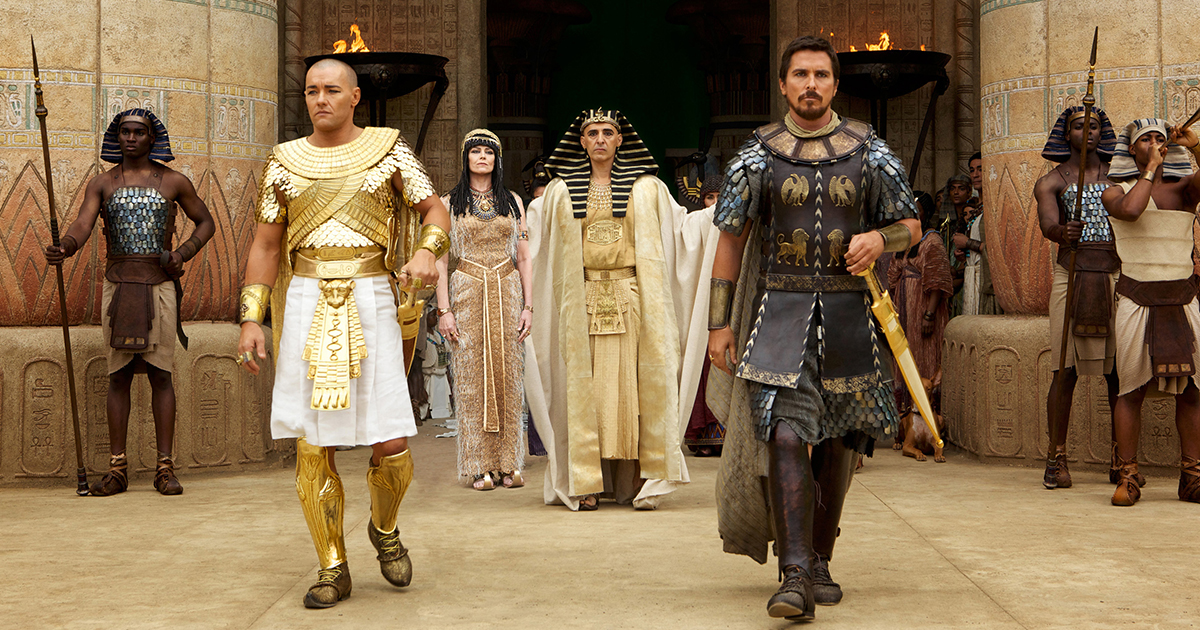[5]
Director Ridley Scott (Alien, Thelma & Louise) takes his shot with the story of Moses, casting Christian Bale in the lead opposite Joel Edgerton as Pharaoh Ramses II. Scott’s version skips the preamble of Moses’ life story, opening with Moses and Ramses as young adults in battle against the Hittites where Moses proves more valorous than his royal ‘brother’. Soon thereafter, the two learn of Moses’ true Hebrew heritage, leading to Moses’ exile from Egyptian civilization. He finds a wife (Maria Valverde) and starts a family in the oasis of Canaan, where he has his experience with the Burning Bush and the voice of God — commanding him to return to Egypt and free his people. There aren’t many people who don’t know the rest of the story: Queue the plagues and death of the firstborn sons, queue the exodus, queue the parting of the Red Sea and the creation of the Ten Commandments.
At two-and-a-half hours, Exodus: Gods and Kings moves by very quickly, taking full advantage of the latest technology to bring the visual effects to life and expand this ancient world like we’ve never seen it before. The story itself is never boring, but it suffers more than any other version I’ve seen in a critical way: character. Moses and Ramses do not have a strong relationship at the start of the film, so there’s not much drama later when they become enemies. Moses also doubts God throughout the film, all the way up until the climactic parting of the Red Sea. He argues with God, and God (portrayed by a young boy only Moses can see) seems amused that Moses does not agree with Him on everything. It’s a curious treatment that is sure to disappoint many viewers. A Moses with shaky faith? Blasphemous at worst, but even at best, it makes him a weak main protagonist — a passive actor in his own story. Ramses is also a weak character, riddled with constant doubt and self-loathing. He never fully reaches the level of villainhood we expect.
Scott takes a more grounded, historical approach to the material, trying to explain the Burning Bush scene and the plagues with science more than magic. This is an interesting approach that makes these scenes more believable, but without robbing them completely of their divine insinuations. The problem is that later scenes, including the death of the firstborn and the parting of the Red Sea, require absolute magic — there’s no way to explain these phenomena with science. So why bother shying away from the supernatural in the first place? The decision actually robs the film of an impactful climax, when it takes nearly a full day for the Red Sea to slowly part by means of changing currents. Dear Ridley Scott: How on Earth could you make the parting of the Red Sea one of the most boring scenes in your Exodus movie?
The best performances come from John Turturro as Pharaoh Seti in early scenes, and Ben Kingsley as Nun, the Hebrew slave who reveals how Moses came to live with the Pharaoh’s family. Sigourney Weaver unfortunately gets precious little to do as Ramses’ mother, Tuya. Alberto Iglesias’ score isn’t as strong as it should be, but the design of the film — the sets and wardrobe — is very good.
If it sounds like I hate this movie, I don’t. It kept my interest throughout, and the story is strong enough to weather many poor decisions in the execution. Even if it fails to inspire as it should, it still works as a well-paced epic, and Scott knows how to deliver the cinematic goods as much as anyone. The plagues have never felt more palpable in a movie, and the whole film benefits from being viewed in 3D.
If you want to see a version of this story with much more compelling depictions of Moses and Ramses, and a far more powerful sense of wonder in the presence of the divine, don’t miss Dreamworks Animation’s The Prince of Egypt. It covers the exact same ground as this film (it even includes the preamble). When the Red Sea parts in that film, by God, my heart stops.
With Ben Mendelsohn and Aaron Paul.

